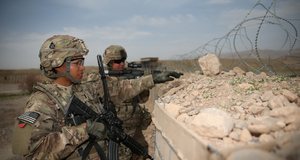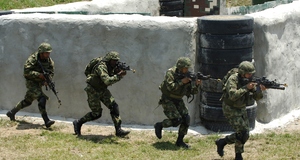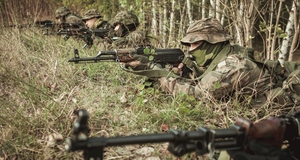Army Girls: The Role of Militarization in Women's Lives
By
2009, Vol. 1 No. 11 | pg. 1/1
KEYWORDS:
In her book, Maneuvers: The International Politics of Militarizing Women’s Lives (2000), Cynthia Enloe examines the role militarization plays in women’s lives. Enloe defines militarization as “a step-by-step process by which a person or a thing gradually comes to be controlled by the military or comes to depend for its well-being on militaristic ideas.”(p 3, Enloe, 2000). She explains that a militarized individual “comes to imagine military needs and militaristic presumptions to be not only valuable but also normal” (p 3, Enloe, 2000). Enloe believes militarization to be harmful to a society, as it allows the military to exploit the resources of the society it claims to protect by convincing it that the military’s actions are valuable, necessary, and often even something to take pride in. Enloe writes: The key to control is to define women as creatures marginal to the military’s core identity, no matter how crucial in reality are the services they perform (and the symbolism they provide) to the smooth operations of the military. By contrast, when women begin to act in their own interests, military commanders suspect that their control is slipping. (p 45, Enloe, 2000). This quote helps to explain how militarization affects women. First, one must examine some of the essential services women provide for the military. Enloe explains why the military focuses on women; “the militarization of women has been crucial for the militarization of governments and of international relations. The militarization of women has been necessary for the militarization of men.” (p 3, Enloe, 2000) Women are used as tools for the military, “Military policy makers have needed women to play a host of militarized roles: to boost morale, to provide comfort during and after wars, to reproduce the next generation of soldiers, to serve as symbols of a homeland worth risking one’s life for, to replace men when the pool for suitable male recruits is low” (p 44, Enloe, 2000). Women are second-class contributors to the military, but contributors nonetheless. Women’s cooperation is clearly essential to the operations of the military yet, because our society and government are male-dominated, women are marginalized by the military. To marginalize is defined by Miriam-Webster as “to relegate to an unimportant or powerless position within a society or group” (marginalize, 2009). Women are often unimportant and/or powerless in the military. Women are excluded from combat and the vast majority of military officials are men. Not only are women excluded from power within the military, but their position in society at large is often degraded by the military. Women’s exclusion from the military was used as an argument against women’s suffrage in the early 1900s (p 7, Enloe, 2000). Women who depend on the military for their livelihood are stereotyped as prostitutes; “in the late twentieth century, women who have been mobilized to serve the military’s needs are still vulnerable to the stereotype of camp follower—dispensible, disreputable—no matter how professional their formal position is in the military” (p 40, Enloe, 2000). These women are sexualized by the military as a way to keep them in the margins. Wartime and peacetime sexualization of the female body aids the military in marginalization because it depicts women as objects, tools for sexual satisfaction, and not fully human. Enloe explains that objectifying women makes it easier for military officials to marginalize them, “it was far easier for commanders to send women out of camp if they could be portrayed as rootless, promiscuous, parasitic, and generally a drag on the military’s discipline and battle readiness” (p 40, Enloe, 2000). Images of women in popular culture train women to accept their marginalized roles. During World War II, for instance, Rosie the Riveter encouraged women to take up the jobs their husbands left behind. The television program Army Wives on Lifetime tells the story of four women whose husbands work for the military. The women embrace the label “army wife” as a patriotic duty to their country. Enloe describes a similar situation; “Ms. Waters did not feel used. She took the label ‘honorary military wife’ as a compliment. It gave her satisfaction, a role to play, a respected status… [and] a personal investment in the base” (p 44, Enloe, 2000). Images of militarized women in popular culture are used by the military to convince women that their marginalized roles are something to be proud of. If women can be convinced to take pride in their second-rate roles, they are unlikely to fight against them. Women are also unlikely to fight back against the military’s marginalization of them because they may believe their roles to be natural. Enloe writes: “The persistence of the presumption that women’s militarization is simply the outcome of nature or custom is one of the things that grants gendered militarization its stubborn longevity” (p 34, Enloe, 2000). She suggests that women are reluctant to fight militarized gender roles because they often believe the roles to be a result of nature, not strategic decisions. By marginalizing women, the military maintains control over women and the services they provide. Enloe writes about women, specifically camp followers, “performing tasks that any large military force needs but wants to keep ideologically peripheral to its combat function and often tries to avoid paying for directly” (p 40, Enloe, 2000). This statement emphasizes the male-domination of the military. Both men and women contribute to the military. Men serve as soldiers, get paid for their work, and are respected for it. Women perform essential tasks for the military as well, but they are not paid or recognized for their contributions and often receive only disrespect for the services they perform. The second part of Enloe’s quote states: “when women begin to act in their own interests, military commanders suspect that their control is slipping” (p 45, Enloe, 2000). Essentially, when women resist militarization, a military’s control over a society weakens. She acknowledges that it can be difficult for women to resist militarization, especially in a time when “the newest maneuver has been to camouflage women’s service to the military as women’s liberation” (p 45, Enloe, 2000). Women have historically been excluded from soldiering and many feminists have fought for women’s right to participate in the military as soldiers. Enloe emphasizes that we must go beyond questioning equality in the military, and instead focus on the broader impact of militarization on a society; “It has been feminists’ self-conscious investigation of what serves to privilege masculinity that has prompted so many— though not all— feminists in so many countries to go beyond questioning equality inside the military, to question militarization itself” (p 33, Enloe, 2000). Women need to be aware of how militarization affects them on a daily basis and develop tools to analyze the militarized messages they are bombarded with. When women realize that their militarized roles are not their biological destiny, they can come together to resist the militarization of all aspects of society. ReferencesEnloe, C. (2000). Manuevers: The international politics of militarizing Women’s lives . Berkeley and Los Angeles, California: University of California Press. marginalize. (2009). In Merriam-Webster Online Dictionary. Retrieved March 16, 2009, fromhttp://www.merriam-webster.com/dictionary/marginalize Suggested Reading from Inquiries Journal
Inquiries Journal provides undergraduate and graduate students around the world a platform for the wide dissemination of academic work over a range of core disciplines. Representing the work of students from hundreds of institutions around the globe, Inquiries Journal's large database of academic articles is completely free. Learn more | Blog | Submit Latest in Sociology |














